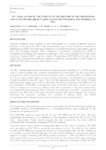Use este identificador para citar ou linkar para este item:
http://www.alice.cnptia.embrapa.br/alice/handle/doc/1064401| Título: | Evaluation of the toxicity of the mixture of diflubenzuron and p-chloroaniline in tilapia fish in the presence and absence of soil. |
| Autoria: | DANTZGER, D. D.  JONSSON, C. M.   NUNES, A. A. S.   AOYAMA, H.   |
| Afiliação: | DARLENE DENISE DANTZGER, IB-UNICAMP; CLAUDIO MARTIN JONSSON, CNPMA; A A S NUNES; HIROSHI AOYAMA, IB-UNICAMP. |
| Ano de publicação: | 2016 |
| Referência: | In: CONGRESSO BRASILEIRO DE ECOTOXICOLOGIA, 14., 2016, Curitiba. Anais.... Curitiba: Sociedade Brasileira de Ecotoxicologia. p. 292-293. |
| Conteúdo: | aBSTRACT: Several chemicals occur together in the environment as a result of different sources. However, in the great majority of risk assessments only a single chemical is considered. Diflubenzuron (DFB), the most used compound to combat parasites in aquaculture, can be toxic for non-target species. When degraded, it generates p-chloroaniline (PCA), a potentially carcinogenic and mutagenic compound. This study analyzed the activity of the enzymes: Catalase (CAT), acid and alkaline Phosphatase (ACP/ALP) of the gills of the Tilapia fish (Oreochromis niloticus) exposed to different concentrations of the mixture of DFB and PCA in the presence and absence of soil. |
| Thesagro: | Agrotóxico Impacto ambiental Toxidez Tilápia nilótica Catalase Aquicultura |
| NAL Thesaurus: | Aquaculture Diflubenzuron Antiparasitic agents Ecotoxicology soil |
| Palavras-chave: | P-chloroaniline Phosphatases |
| Tipo do material: | Resumo em anais e proceedings |
| Acesso: | openAccess |
| Aparece nas coleções: | Artigo em anais de congresso (CNPMA)  |
Arquivos associados a este item:
| Arquivo | Descrição | Tamanho | Formato | |
|---|---|---|---|---|
| 2016AA38.pdf | 17,61 kB | Adobe PDF |  Visualizar/Abrir |









